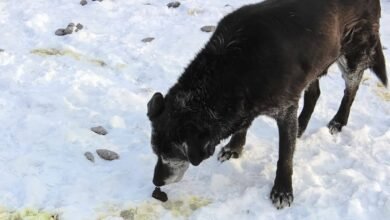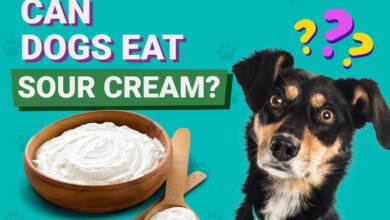
Are Honey Nut Cheerios Okay for Dogs? If you’re considering sharing Honey Nut Cheerios with your dog, it’s helpful to know what they’re made of. Honey Nut Cheerios are a popular breakfast cereal crafted from whole grain oats, sugar, and honey. They also include almond flavoring, artificial flavors, and preservatives.
While these cereals are a tasty option for us, they’re designed specifically for people, not pets. In this article, we’ll explore whether it’s safe to give Honey Nut Cheerios to your dog and what you should keep in mind to ensure your pet’s health.Let’s briefly discuss that- Are Honey Nut Cheerios Okay for Dogs?
Are Honey Nut Cheerios Toxic to Dogs?
When it comes to sharing your food with your furry friend, it’s important to understand what is and isn’t safe. Are Honey Nut Cheerios okay for dogs? The short answer is that while Honey Nut Cheerios are not toxic to dogs, they aren’t the best choice for your pet’s diet. Here’s a closer look at why Honey Nut Cheerios might not be ideal for your dog:
Not Toxic, but Not Ideal:
- High Sugar Content: Honey Nut Cheerios contain significant amounts of sugar, which can lead to various health issues for dogs, including obesity and diabetes.
- Occasional Treat: In very small amounts, Honey Nut Cheerios are unlikely to cause harm, but they should only be given as an infrequent treat rather than a regular part of your dog’s diet.
Almond Flavoring Concerns:
- Potential Allergies: The almond flavoring in Honey Nut Cheerios could trigger allergic reactions in some dogs. If your dog has a known allergy to nuts or similar ingredients, it’s best to avoid these cereals altogether.
Safe in Very Small Amounts:
- Limited Serving: If you choose to give your dog Honey Nut Cheerios, limit the amount to just a few pieces. Avoid making them a regular part of your dog’s diet to prevent any negative health effects.
While Honey Nut Cheerios are not toxic to dogs, their high sugar content and artificial ingredients make them less suitable for regular feeding. It’s always better to opt for treats specifically designed for dogs or natural snacks that offer more health benefits.
Are Honey Nut Cheerios Okay for Dogs? Nutritional Imbalance Explained
When it comes to feeding your dog, it’s crucial to ensure that their diet is balanced and provides all the essential nutrients they need. Are Honey Nut Cheerios okay for dogs? While these cereals may seem like a convenient snack, they are not ideal for maintaining your dog’s health. Let’s break down why Honey Nut Cheerios might not be the best choice for your furry friend:
High in Carbohydrates but Lacks Essential Nutrients:
- Carbohydrate Content: Honey Nut Cheerios are primarily made up of carbohydrates from whole grain oats and sugar. While carbohydrates are a part of a balanced diet, they are not as crucial for dogs as proteins and fats.
- Missing Proteins and Fats: Unlike commercial dog foods, which are formulated to provide a balanced mix of proteins and fats, Honey Nut Cheerios lack these essential nutrients. Proteins and fats are vital for your dog’s muscle maintenance, energy levels, and overall health.
Excessive Sugar Can Lead to Health Issues:
- Obesity and Diabetes: The high sugar content in Honey Nut Cheerios can contribute to weight gain and increase the risk of developing diabetes in dogs. Excess sugar in a dog’s diet can also lead to poor dental health, including cavities and gum disease.
- Poor Dental Health: Dogs that consume sugary foods may experience more plaque and tartar buildup, leading to potential dental issues over time.
Lack of Substantial Vitamins and Minerals:
- Limited Nutritional Benefit: Honey Nut Cheerios do not provide the essential vitamins and minerals that dogs need for a balanced diet. While they are fortified with nutrients for human consumption, these do not necessarily translate to benefits for dogs.
- Better Alternatives: For a nutritious treat, look for dog-specific treats or whole foods that are rich in vitamins and minerals suited to canine dietary needs.
While Honey Nut Cheerios might be a tempting treat, they do not offer the balanced nutrition that dogs require. Their high carbohydrate and sugar content, combined with a lack of essential proteins and fats, make them an unsuitable choice for regular feeding. For healthier options, consider treats specifically designed for dogs or natural snacks that contribute positively to their diet.
Understanding the Health Risks
When considering what treats are safe for your dog, it’s important to be aware of potential health risks. Are Honey Nut Cheerios okay for dogs? While they may seem like a harmless treat, Honey Nut Cheerios come with certain health risks that can affect your dog. Here’s a closer look at why they might not be the best choice for your furry friend:
High Sugar Content:
- Weight Gain: The significant amount of sugar in Honey Nut Cheerios can contribute to weight gain in dogs. Excessive sugar in a dog’s diet can lead to obesity, which can cause a range of health problems, including joint issues and decreased mobility.
- Dental Problems: Sugar can also negatively impact your dog’s dental health. Increased plaque and tartar buildup can lead to gum disease, cavities, and other dental issues.
- Long-Term Health Issues: Regular consumption of sugary foods can increase the risk of developing diabetes and other long-term health conditions.
Processed Ingredients:
- Digestive Upset: Honey Nut Cheerios contain processed ingredients and artificial additives that may upset a dog’s digestive system. Dogs with sensitive stomachs may experience nausea, diarrhea, or other gastrointestinal issues.
- Food Sensitivities: Some dogs may have sensitivities to certain processed ingredients, leading to discomfort or allergic reactions.
Almond Flavoring and Artificial Additives:
- Allergic Reactions: The almond flavoring and artificial additives in Honey Nut Cheerios can pose a risk for allergic reactions in some dogs. Symptoms might include itching, swelling, or gastrointestinal distress.
- Increased Sensitivity: Dogs with existing allergies or sensitivities might react more strongly to these ingredients, making it essential to avoid treats that could exacerbate their conditions.
While Honey Nut Cheerios might seem like a convenient treat, they carry several health risks for dogs. The high sugar content, processed ingredients, and potential allergens make them unsuitable for regular feeding. Instead, consider healthier alternatives that are specifically designed for dogs to ensure their well-being and overall health.
When Can You Give Your Dog Honey Nut Cheerios?
While Are Honey Nut Cheerios okay for dogs might be a question many pet owners have, it’s crucial to understand the right circumstances for offering them to your dog. Here’s what you need to know about safely giving your dog Honey Nut Cheerios:
Occasional Treat:
- Tiny Amounts Only: Honey Nut Cheerios can be given as a very occasional treat in small quantities. A few pieces now and then won’t likely harm your dog, but they should not be a regular part of their diet.
- Limit Quantity: Ensure that the amount given is minimal. Overindulgence can lead to health problems due to the sugar and additives in the cereal.
Avoid for Certain Health Conditions:
- Allergies: If your dog has a history of allergies, it’s best to avoid Honey Nut Cheerios. The almond flavoring and artificial additives could trigger allergic reactions.
- Obesity: For dogs that are overweight or obese, avoid giving them Honey Nut Cheerios. The high sugar content can exacerbate weight issues.
- Diabetes: Dogs with diabetes should not be given Honey Nut Cheerios due to their high sugar content, which can affect blood sugar levels.
Monitor for Reactions:
- Digestive Distress: After giving your dog Honey Nut Cheerios, keep an eye out for any signs of digestive upset, such as vomiting or diarrhea.
- Allergic Reactions: Watch for symptoms of allergic reactions, such as itching, swelling, or changes in behavior.
While Honey Nut Cheerios can be given to dogs occasionally in small amounts, they should be used sparingly and only if your dog does not have specific health issues. Always monitor your dog after giving them this treat and consult with your vet if you have concerns about their diet or health.
What Are Safer Alternatives to Honey Nut Cheerios?
If you’re concerned about whether Honey Nut Cheerios are okay for dogs, you might want to explore some safer alternatives. While Honey Nut Cheerios can be given in small amounts, they’re not the best option for your dog’s regular diet due to their high sugar and additive content. Fortunately, there are several healthier alternatives that can be both tasty and nutritious for your furry friend.
Plain Cheerios (Unsweetened):
- Fewer Risks: Plain Cheerios without added sugars or flavors present fewer risks compared to Honey Nut Cheerios. They contain less sugar and no artificial additives, making them a safer choice for occasional treats.
- Lower Sugar Content: By opting for unsweetened Cheerios, you reduce the risk of contributing to weight gain or dental problems in your dog.
Healthy Dog Treats:
- Natural Ingredients: Look for dog treats made from natural ingredients that are specifically formulated for pets. These treats are designed to meet your dog’s nutritional needs without the risks associated with processed foods.
- Nutritional Balance: Dog-specific treats often contain balanced nutrients that support overall health, including proteins, fats, and essential vitamins.
Fruits and Vegetables:
- Nutritious Snacks: Fresh fruits and vegetables can be excellent, natural snacks for your dog. Options like carrots, apples (without seeds), and blueberries are rich in vitamins and fiber.
- Health Benefits: These natural treats offer health benefits, including improved digestion and reduced risk of obesity, without the added sugars or artificial ingredients found in cereals.
In summary,
While Honey Nut Cheerios are okay for dogs in very small amounts, there are healthier alternatives that are better suited to meet your dog’s dietary needs. Opting for plain Cheerios, specially formulated dog treats, or fresh fruits and vegetables can provide your pet with nutritious, safe options that contribute to their overall health and well-being.




